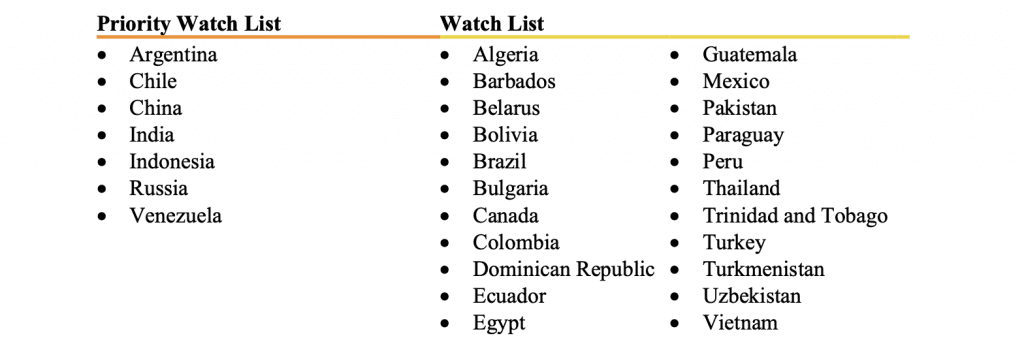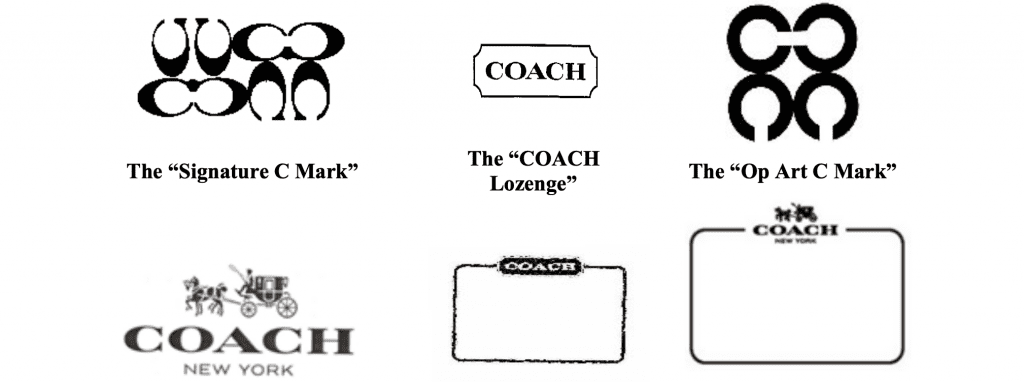China garners no shortage of attention in the latest Special 301 report, with the U.S. Trade Representative keeping the country on the Priority Watch List due to “long-standing issues like technology transfer, trade secrets, bad faith TMs, counterfeiting, online piracy & geographical indications,” and the “slowing pace” of reforms aimed at addressing intellectual property issues. Reflecting on China in its annual review of “foreign countries that fail to provide adequate and effective IP protection and enforcement,” the USTR claims that “many serious concerns remain regarding IP protection & enforcement.”

In an update on China’s standing when it comes to the global counterfeit trade, the USTR states that …
– China continues to be the world’s leading source of counterfeit & pirated goods. For example, a 2022 report identified China & Hong Kong as the largest exporters of counterfeit cosmetics, accounting for approximately 83% of counterfeit cosmetics customs seizures.
– China & Hong Kong accounted for over 75% of the value measured by MSRP of counterfeit/pirated goods seized by U.S. Customs.
A couple of key issues worth noting come by way of: (1) the oversized sales of counterfeits via e-commerce platforms (the market for which is “the largest in the world”), and (2) the status of developments re: bad faith trademark filings.
E-Commerce Issues: “China’s e-commerce markets remain a source of widespread counterfeits,” per the USTR. Although some leading online sales platforms have “streamlined procedures & improved monitoring, concerns remain about ineffective, inefficient & duplicative takedown procedures, unresponsiveness to requests from small- and medium-sized enterprises, insufficient measures to deter repeat infringers & fraudulent counter-notifications that require court action by rights holders to secure removal of counterfeit goods.” Obstacles to criminal enforcement arise from “the methods by which online platforms record sales; difficulties in obtaining records to pursue investigations & strict evidentiary requirements before the initiation of investigations.”
Bad Faith Filings: The USTR maintains that some progress has occurred, including: (1) China’s recent proposal of further amendments to its TM law to supplement amendments from 2021; (2) several favorable decisions from the Beijing IP Court, including in May 2022 when it refused to adjudicate TM infringement cases where the plaintiff obtained the asserted TM in bad faith; and (3) in July 2022, when it upheld a district court ruling that preemptive registration of TMs in bad faith is a form of unfair competition.
Bad faith TMs still “remain one of the most significant challenges for U.S. brand owners in China,” as the system “still largely lacks effective tools to combat widespread bad faith TM applications, in part because it unnecessarily constrains examiners from considering marks for related goods or services in different classes when evaluating bad faith, likelihood of confusion & other matters,” the USTR states. Moreover, right holders report that “even if one bad faith TM is successfully challenged, there is little consistency with respect to other applications by the same or related entities.”
Other issues stem from the fact that the Chinese TM proceedings “give insufficient legal weight to notarized & legalized witness declarations and have unreasonably high standards for establishing well-known TM status and do not give full consideration to consent and co-existence agreements.”
THE BIGGER PICTURE: Not limited to China, of course, the USTR says that “stakeholders also raised concerns about continued blatant bad faith TMs being registered in the EU and its Member States, [as] bad faith is not a ground to reject or oppose trademark applications at the EUIPO & the EU TM Reg. does not require Member States to include bad faith in the grounds for rejection and opposition.”

– Tapestry, Inc. v. Hannstar Trading: Coach and its parent co. have initiated a counterfeiting suit following U.S. Customs seizures last year. A selection of Coach TMs from the complaint is above.
– Skechers v. Hermès: The footwear co. and the Birkin bag-maker have settled a design patent lawsuit over sneakers.
– Nike v. StockX: Nike has prevailed in a discovery matter, with the court finding that it showed that “the law clearly requires StockX to produce the results of its authentication process & that the work product privilege does not protect StockX’s conclusions as to whether the shoes in a specific instance were counterfeit. (The parties in the NFT-centric suit also got a scolding in the court’s order re: their “bickering.”)
– Rails v. At Last: A © infringement case over tie dye patterns that appear on fast fashion garments
A few fashion/resale/web3 notes …
Kering generated 5.1B euros ($5.60B) in Q1 revenue. Sales at Gucci were (somewhat surprisingly) up by 1%, while sales in the “Other Houses” group, where Balenciaga sits, were down by 9%.
eBay is expanding its luxury offerings w/ a new brand platform, Certified by Brand program, which sees it partner w/ brands. This comes amid existing efforts by eBay, such as its “Authenticity Guarantee” initiative, which currently includes sneakers, handbags, watches, jewelry, etc., and which raises Qs (for me) from a potential false advertising POV.
Metahuman Creator has crafted a digital avatar of supermodel Eva Herzigová – using her facial data/geometry, motion data &a 3D figure of her body based on photo reference materials/provided measurements – to meet the demands of “a new era of mixed reality fashion experiences.” The prospect of digitized models raises a number of issues – including from an image rights/protection perspective. You’ll recall that we’ve seen models making moves in the image rights/portrait rights dept. – in the U.S. & EU – before. (More about that here and here.)
In some deal-making news in the fashion/retail, tech & web3 segments …
– Paris-based resale co. Monogram has raised almost €3M in a new round led by family office HWA.
– Universal Ledger raised $10M via SAFE notes for its crypto wallet-as-a-service tech in a round led by Hard Yaka.
– Vince Holding Corp. has entered into a strategic partnership w/ Authentic Brands Group, whereby Vince will contribute its IP to the parties’ new venture, ABG Vince, in exchange for $76.5M in cash & a 25% stake in ABG Vince.
– After announcing plans to sell Bonobos, Walmart will sell plus size fashion brand Eloquii to FullBeauty Brands. The terms of the deal have not been disclosed.
– Our roundup of AI and generative AI funding is right here.